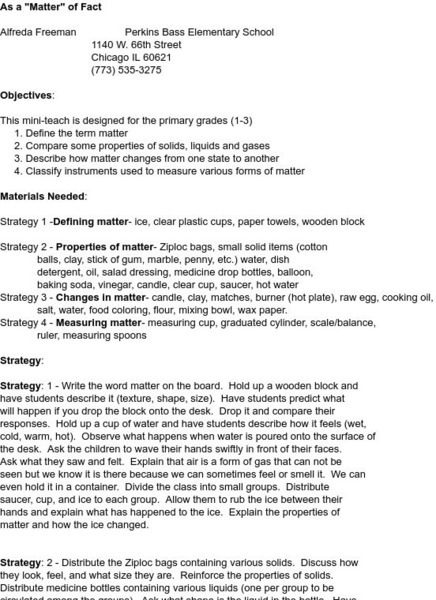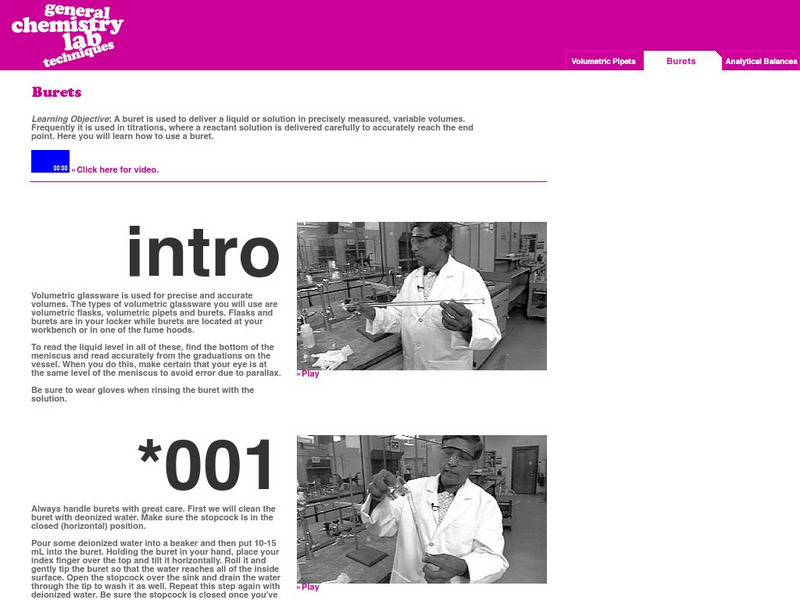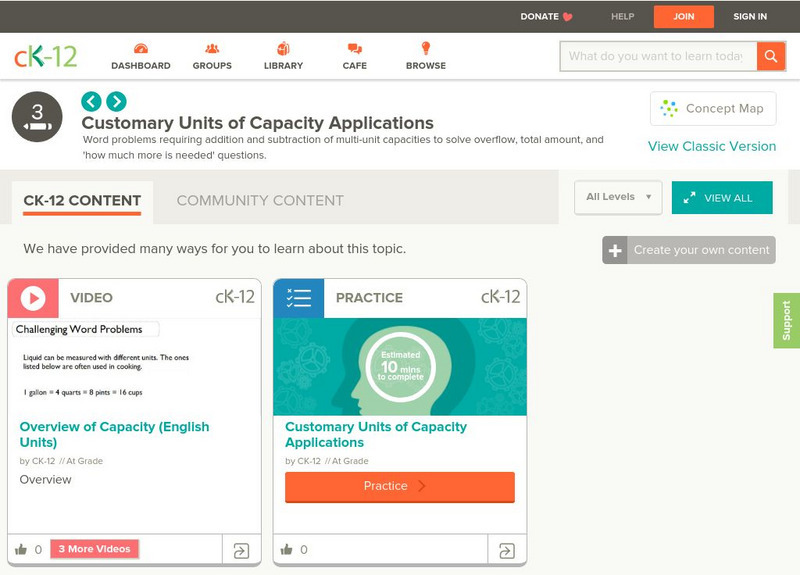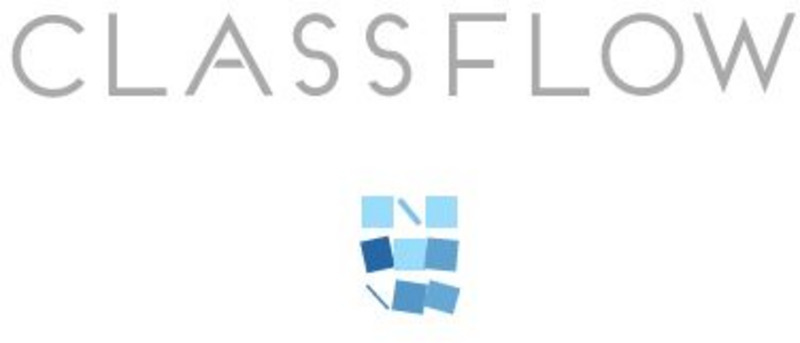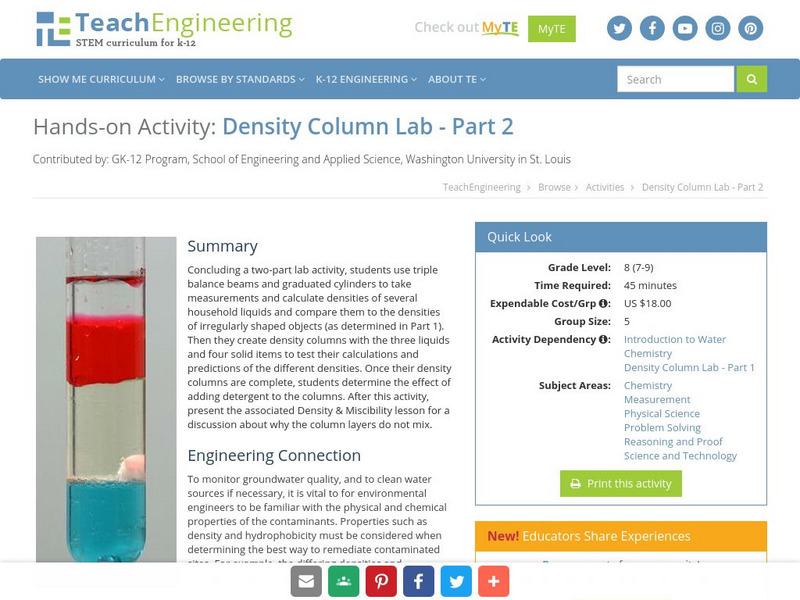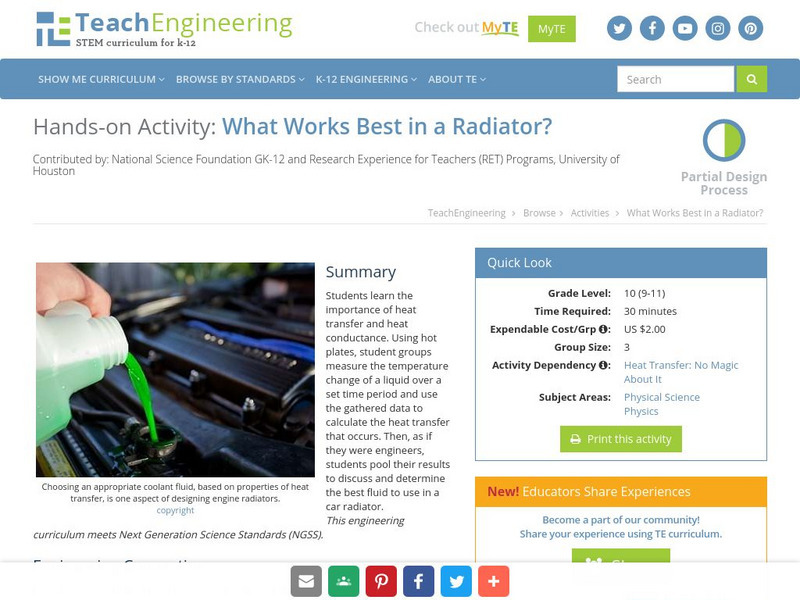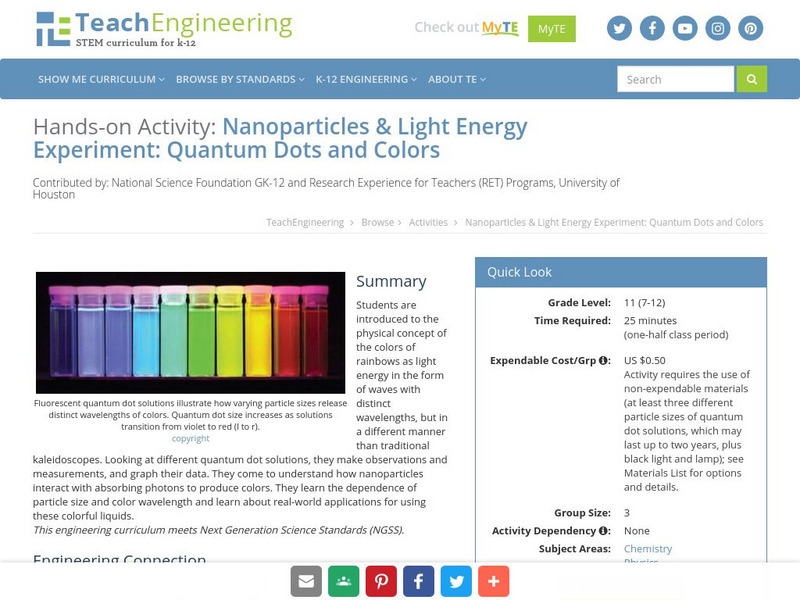ClassFlow
Class Flow: Meet Mr. Gallon
[Free Registration/Login Required] This flipchart introduces students to Mr. Gallon, a graphic organizer for customary capacity measurement. It includes a story, songs, a PowerPoint, pattern for making Mr. Gallon, an interactive Mr....
Math Is Fun
Math Is Fun: Introduction to Us Standard Units
Students learn how to measure things using US Standard Units. Liquids, mass, length, and temperature are explored. Practice problems are included.
American Chemical Society
Middle School Chemistry: The Ups and Downs of Thermometers
Based on experimental observations, students describe, on the molecular level, why the liquid in a thermometer goes up when it is heated and down when it is cooled.
National Council of Teachers of Mathematics
Nctm: Figure This: Drip Drops
Figure out how much water you waste in a week in this exploration using your problem solving, measurement, and estimation skills. This activity is from the NCTM Math Challenges for Families series.
Science and Mathematics Initiative for Learning Enhancement (SMILE)
Smile: As a "Matter" of Fact
In this lesson plan site, students will define matter and compare properties of solids, liquids and gases.
PBS
Pbs Teachers: Water Density
Demonstrate the effect that dissolving different amounts of salt in water has on the density of the liquid.
Yale University
Yale University: General Chemistry Lab Techniques: Burets
Tutorial shows proper procedure for handling a buret and using this piece of laboratory equipment to measure liquid volume. View accompanying video full-length [18:00] or in segments.
Wolfram Research
Wolfram Science World: United States System of Liquid and Dry Measures
Unlike the British Imperial system, the United states uses two different systems, one for liquid volumes and one for dry volumes. Confusingly, these two systems share the units of quart and pint, which have different values. This site...
PBS
Pbs Kids Afterschool Adventure!: Operation: Appetite for Fractions Activity Plan
In this week's Afterschool Adventure, Appetite for Fractions, children will explore fractions as they help create, divvy up, and serve a variety of real and virtual snacks.
Alabama Learning Exchange
Alex: Souper Scooper
This hands-on, inquiry based activity is an extension of the AMSTI Science Module, Solids and Liquids. Learners use nonstandard units to measure beans in a soup mix. Students predict how many beans will be in a scoop. Learners group...
Science Education Resource Center at Carleton College
Serc: Fluid Viscosity
To give students a feeling for both what viscosity values are and how they are measured in the lab, they measure fluid viscosity by dropping ball bearings into graduated cylinders of fluids.
American Chemical Society
Middle School Chemistry: The Ups and Downs of Thermometers
See how thermometers measure temperature by the molecular movement of the liquid inside.
Other
Garden With Insight: Vapor Pressure in the Garden
Basic information about the role of vapor pressure in the garden. In addition, a free garden simulator can be downloaded in which various quantities can be measured.
Physics Aviary
Physics Aviary: Graduated Cylinder Challenge
Check your ability to read a few different sized graduated cylinders.
Science Struck
Science Struck: How to Find Volume With Water Displacement Method
Tells the story of how Archimedes discovered the Archimedes Principle and his water displacement method for determining the volume and density of an object. Provides an explanation and several examples of how it is done.
CK-12 Foundation
Ck 12: Elem Math: Determining Amount of Overflow Word Problems
[Free Registration/Login may be required to access all resource tools.] Students watch a video overview on how to find the amount of overflow in a capacity problem.
CK-12 Foundation
Ck 12: Elem Math: Addition of Sequential Capacities Word Problems
[Free Registration/Login may be required to access all resource tools.] Students watch a video overview on finding sequential capacities of several containers.
Science Education Resource Center at Carleton College
Serc: Mn Step: Study of Student Precision Using Volumetric Glassware
This activity is an exercise in using various lab equipment for measuring the volume of a liquid. Data is recorded on a spreadsheet and analyzed to see which tool offers the greatest precision.
ClassFlow
Class Flow: Matter
[Free Registration/Login Required] This flipcharts explains the basics of matter. Opportunities for student involvement include measuring solids, identifying matter, and a sorting activity.
TeachEngineering
Teach Engineering: Make That Invisible! Refractive Index Matching
Students determine the refractive index of a liquid with a simple technique using a semi-circular hollow block. Then they predict the refractive index of a material (a Pyrex glass tube) by matching it with the known refractive index of a...
Other
Ohio Department of Education: Sixth Grade Achievement Test (Practice Test) [Pdf]
Half-length practice test for the third grade OAT (Ohio Achievement Test). The test includes 17 multiple-choice and 4 open-response question dealing with topics such as geometry (triangle identification, surface area), number sense...
TeachEngineering
Teach Engineering: Density Column Lab Part 2
Concluding a two-part lab activity, students use triple balance beams and graduated cylinders to take measurements and calculate densities of several household liquids and compare them to the densities of irregularly shaped objects (as...
TeachEngineering
Teach Engineering: What Works Best in a Radiator?
Students learn the importance of heat transfer and heat conductance. Using hot plates, student groups measure the temperature change of a liquid over a set time period and use the gathered data to calculate the heat transfer that occurs....
TeachEngineering
Teach Engineering: Quantum Dots and Colors
Students are introduced to the physical concept of the colors of rainbows as light energy in the form of waves with distinct wavelengths, but in a different manner than traditional kaleidoscopes. Looking at different quantum dot...
Other popular searches
- Measuring Liquids and Solids
- Metric Measuring Liquids
- Measuring Liquids in Math
- Measuring Liquids Lab
- Measuring Liquids and Masses






